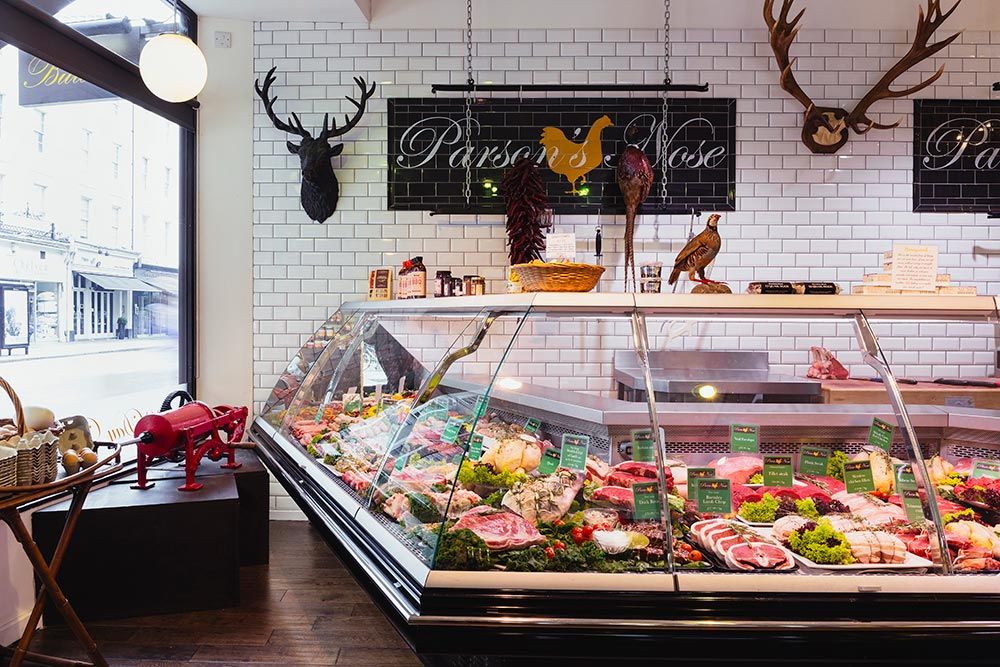In terms of how to eat meat sustainably, this debate goes beyond just enjoying food, considering where your produce is sourced from, what the animals are fed and how they are prepared before reaching the shop.
Deciding to shop with more awareness will allow you to take the steps towards more environmentally conscious eating, making decisions that will positively impact both people and the planet. In this article we explore the idea of sustainable meat consumption, whether it’s possible, and how butchers like us work towards being more sustainable in the meat industry.
Our Guide to Eating More Sustainably
When making the decision to shop, and eat, more sustainably, it can be difficult to know how best to begin your journey. Starting a more eco-conscious lifestyle doesn’t mean you have to shop and eat exclusively vegan. In fact, there are many ways to begin doing this while keeping your favourite meals firmly in the cookbook.
Below are some key starting points to consider when looking to make this lifestyle change:
- Buy your meat from the right places
A key part to eating more sustainable meat is to ensure the shop, butcher or seller you buy your food from operates sustainably. This includes working with ethical farmers, making sure all livestock are treated, fed, and slaughtered humanely.
By going to stores or local butcher shops that stock produce directly from local and British farms, you can rest assured that animal welfare standards have been satisfied. We touch upon this in our butcher’s meat vs supermarket meat article.
- Ensure all livestock is treated well
Linking to our previous point, consider how the livestock on the supplying farms are treated. It is vital to ensure that all animal welfare laws are being met, making sure the animals are free-range and pasture fed. Some farms use growth hormones and antibiotics to ensure their livestock are more profitable, so do your research before committing to buy from certain sellers.
All butcher shops should be able to provide details on the origin of their meats, so don’t be afraid to ask questions.
British farms must abide by the laws aligned with the Food Standards Agency, committing to the fair treatment of livestock. For example, keeping animals in large enough spaces, access to outside and are treated without excessive force and additional stress. Most pesticides are also prohibited when it comes to feed growth too, to avoid humans consuming these pesticides as a result.
- Try Meatless Monday
The idea behind this campaign is a recognised global movement that encourages people to reduce meat in their diet not only for their health but for the benefit of the planet. If you’re a meat lover but care about meat sustainability, Meatless Monday is the perfect idea to try.
Participants are encouraged to cook a vegan or vegetarian meal at least once a week. According to Climate Generation, 7% of global greenhouse gas emissions are from the meat industry. Therefore, if everyone in the UK took part in this, we could reduce our carbon footprint by this percentage.
- Avoid food waste
According to a recent UN report, people are wasting around a billion tons of food a year, with 17% of that from restaurants and shops. If we aim to minimize the overproduction of produce, the benefits to the environment are plenty.
Leftovers play a huge part in the over production of meat and the waste we produce. Plan your meals in advance to avoid unnecessary waste, prepare healthy and filling portions that won’t get left on your plate and only buy what you know you will consume. This will help reduce the amount, you throw away and the less you buy.
Sustainability in the meat industry- is it really possible?
What is ‘ethical’ meat? Can livestock truly be ethical and if so, how we can trust our sources? This debate has been a long-standing discussion.
There have been many disagreements surrounding the morality behind livestock keeping. It is often said that buying from local farms is the most ethical option and the best for the environment, though supply cannot always meet demand. It is also worth considering the concept of food miles, and which meat available near you is the most eco-friendly.
When it comes to butchers, most will be proud of the local farms they work with, supporting a free-range, hormone-free lifestyle for all livestock that is not only sustainable but also produces the best tasting meat. In general, by shopping with a local butcher, you can rest assured the journey from the farm to your plate considerably shorter, sourced from local farms, ensures the produce you buy is fresher and less mass produced.
So what is the most sustainable meat?
You may be asking, in that case, what is the most sustainable meat? Unfortunately, there isn’t a direct answer for this, there are pros and cons for every product, but more recently in a review by Eco & Beyond, they found chicken and turkey to have the least impact on our environment, followed by salmon, pork, beef then lamb.
Parson’s Nose Butchers & Meat Sustainability
Here at Parson’s Nose, a leading London online butchers we pride ourselves on our excellent relationships with only the best farmers. We have full traceability to all our meat, visit local farms and ensure we are providing the most ethically sourced produce we can get our hands on.
We work hard to showcase that traditional butchery can be both sustainable and ethical. In fact, we launched a series of accredited Farm to Fork workshops in local schools teaching children to raise awareness for sustainable farming and nutrition.
You can browse our extensive range of ethically raised and reared meat delivered throughout London here. Browse our shop or pop into our shops in Putney, Fulham and Kensington today.




-66e018ff8a7de.png)